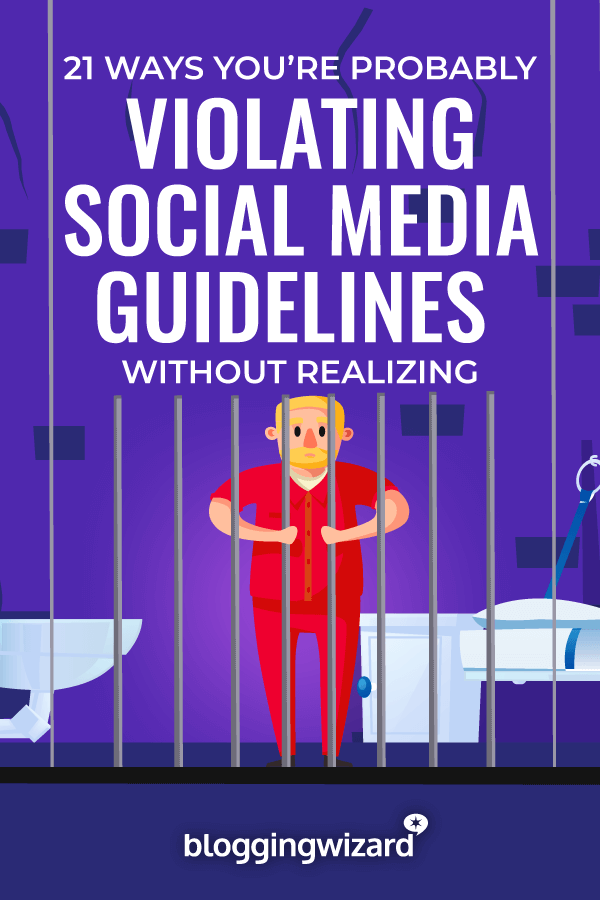21 Ways You’re Probably Violating Social Media Guidelines Without Realizing
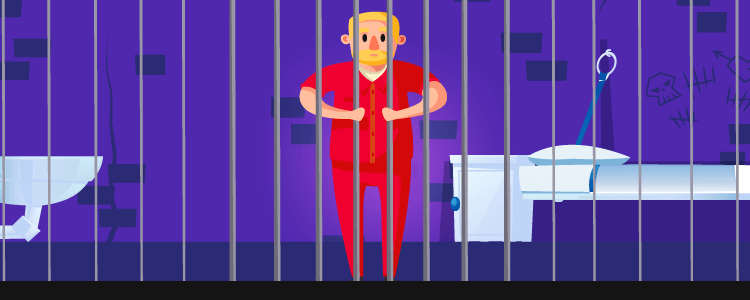
It’s never nice to be told you’re doing something wrong, but when it comes to social platforms and, more specifically, the guidelines, it pays to be in the know about things you could be doing wrong; that could see you violating the social media guidelines without even realizing you’re doing it.
(And I see a lot of y’all doing a few of these on a regular basis …)
Sadly, being punished for violating social media guidelines is a much more serious affair than just getting a telling off; it could lead to content being permanently deleted, accounts being suspended for a prolonged period of time, permanent account terminations, and even prison time or fines!
And more often than not, it’s not just as easy as creating a brand new account when your current one gets deleted.
Let’s take a closer look at the guidelines, policies, and T&Cs on social media platforms that you’re probably violating completely by accident …
1 – Using a stock photo of an actual person as your profile picture.
Where: Twitter
Violates: “You can’t mislead others on Twitter by operating fake accounts.” | Twitter General Guidelines and Policies ~ Platform Manipulation and Spam
Although a stock photo is probably not going to be THE thing that causes your account to get shut down for spam or platform manipulation, it is one of the things that Twitter’s algorithm looks at when determining the real accounts from the fake ones. If someone has a grudge on you and reports your account, having a stock photo as your profile picture will definitely work against you.
A couple of other things that’ll work against you, according to Twitter’s policy, is using “stolen or copied profile bio”, and “use of intentionally misleading profile information, including profile location”.
Who knew putting the wrong location on your Twitter bio could be so controversial?!
2 – You entered the wrong date of birth.
Where: Facebook
Violates: “Do not … misrepresent your identity by … providing a false date of birth.” | Community Standards ~ Misrepresentation
This probably won’t apply to many people, but if you manipulated your date of birth to get yourself a Facebook account before you were legally allowed to (13 years of age), or for other reasons, you could lose your account completely if you get found out.
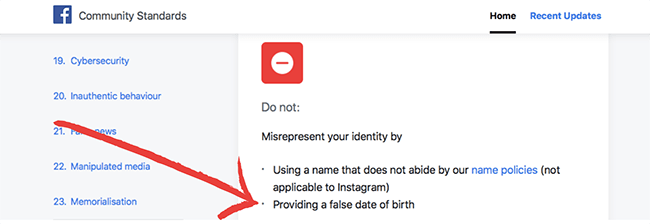
How might that happen, I hear you ask? Well, someone could report you/your account … and you know how quickly people on the internet like to turn the dial straight to petty during a disagreement about something completely benign. If Facebook then asks for identifying information that you can’t provide, you’ll face losing your account.
3 – You’re using the wrong name.
Where: Facebook
Violates: “The name on your profile should be the name that your friends call you in everyday life. This name should also appear on an ID or document from our ID list.” | Names Policy
Following on from using the wrong date of birth, using the wrong name on Facebook can also violate the rules and policies, especially if it looks to the platform that you’re mimicking someone else, or you’re misrepresenting yourself.
Once again, if you’re asked for proof of identification and the account isn’t in a name that you have identification for, you could face permanently losing your account and not being able to get another one.
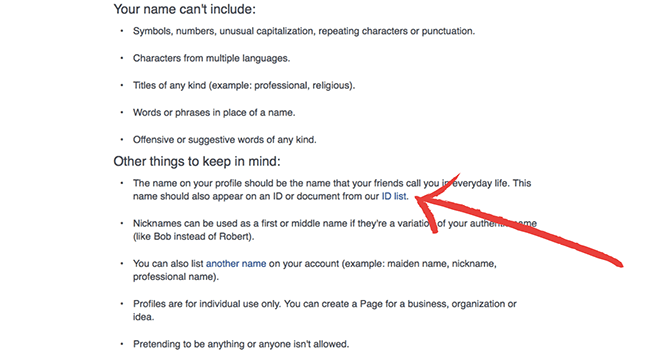
4 – You’re attempting to use a URL as your username.
Where: Instagram
Violates: “You can’t use a domain name or URL in your username without our prior written consent.” | Terms of Use
Some social platforms no longer allow you to enter a domain name or URL as your username, giving you an error message when you do. However, one or two of the platforms did once allow it. I know this because I had both a Facebook and an Instagram username with a URL in it.
In fact, I *still* run a Facebook Page with a URL as the username and, despite REPEATED attempts to try and change it, Facebook refuses to allow it. (Cheers for making my life harder, Facebook.)
It’s easier to avoid a URL username completely than it is to change it later on. I could have my Page suspended or terminated at any moment … and I’m quite nervous about that, to be honest.
5 – You’re not using your social account.
Where: Twitter
Violates: “To keep your account active, be sure to log in and Tweet at least every 6 months. Accounts may be permanently removed due to prolonged inactivity.” | Twitter Rules and policies ~ Inactive account policy
It would be really easy to schedule a bunch of tweets, let them do their thing, and never actually log in to Twitter for a few months. It’s one of those platforms on which you can do that: schedule and then forget all about it. It’s ill-advised, of course, and your engagement and growth will probably be low and slow if you do — but that’s not all the trouble you’ll have if you don’t sign in for a few months.
TikTok also has a mention about inactive accounts in their terms of service, but they don’t provide a time frame. Instead, the platform refers to it as “extended periods of inactivity”.
6 – You create more than one ‘personal’ account.
Where: Facebook
Violates: “You must … create only one account (your own) and use your timeline for personal purposes.” | Terms of Service
You’re only allowed to have one account with Facebook. You can have as many Pages or groups as you like, but only one actual Facebook account is allowed per person. If you get caught with two or more accounts, you could end up losing both. (And, as I’m about to discuss in my next point, you won’t be allowed to start up another one.)
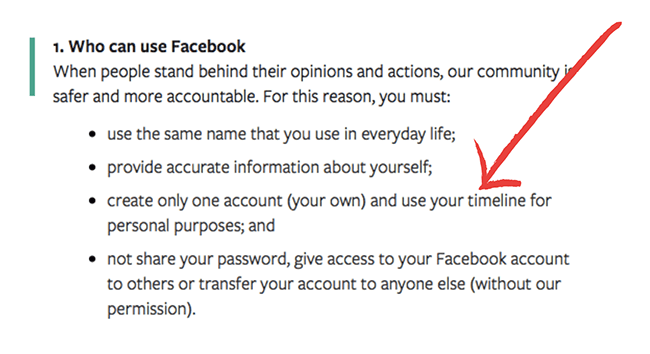
Lots of people do get away with having more than one account, signing in one one account in one browser (such as Safari) and signing in on another using another browser (such as Chrome), with different email addresses attached to the accounts, but there are a lot of people that have lost all of their accounts because they’ve been caught.
7 – You’re using the Pinterest wordmark.
Where: Pinterest
Violates: “Only use the Pinterest badge (please don’t use our wordmark!)” | Brand Guidelines
This entire section of the Pinterest Brand Guidelines is a bit much, if you ask me, but they’re pretty specific about what you can and can’t do as a brand or business on the platform. What doesn’t help, in my opinion, is the fact that you can find and use the Pinterest wordmark on design sites like Canva.
If you were unaware of this rule, it would be easy for you to throw the Pinterest wordmark (and not the badge) on your graphics, thus violating the guideline.
There are a few other guidelines you should read, too:
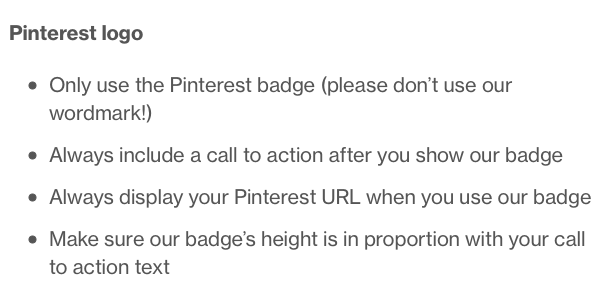
And, further down:
“Our badge should always be reproduced in our Pinterest red, whether it’s in print or on screen.”
Again, going back to Canva, there are differently coloured Pinterest logos that you can use in your designs that could see you/your account getting warned, suspended, or even terminated.
There is even a list of phrases and words businesses/brands can and cannot use when talking about Pinterest in any marketing — and it’s not just Pinterest that’s getting strict with the use of their logos and wordmarks. You can find the very specific Facebook Brand Guidelines on how to use the logo and wordmark (amongst other things) right here.
I was violating a few of these without even realizing!
Are you?
8 – You’re selling mentions, likes, or retweets.
Where: Twitter
Violates: “You can’t artificially inflate your own or others’ followers or engagement. This includes selling/purchasing Tweet or account metric inflation – selling or purchasing followers or engagements (Retweets, Likes, mentions, Twitter Poll votes).” | Platform Manipulation and Spam
I’m not going to name names, but I see a lot of people violating this guideline at the moment. If you’re a blogger offering a promo package to other bloggers (for example) that includes a #FF or #FollowFriday, you’re selling Twitter mentions. In turn, you’re risking getting yourself suspended.
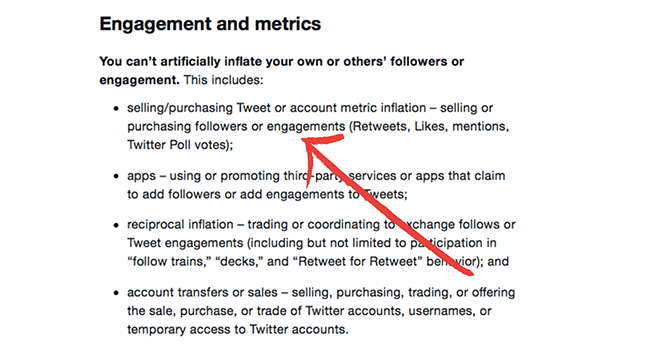
One person is selling engagement, and the other person is buying engagement.
Both parties could face repercussions — suspensions, warnings, permanent account termination, etc.
9 – You’re allowing more than one entry per person on a competition.
Where: Pinterest
Violates: “Don’t allow more than one entry per person.” | Community Guidelines ~ Contest Guidelines
There are actually rather specific guidelines on running competitions across ALL social platforms, and I highly recommend that you do a little bit of reading and researching before you finally press send on the competition announcement post.
Pinterest, specifically, has strict guidelines on how people can enter the competition, how many times they can enter the competition, and even the wording of any write-ups that accompany the competition.
You’re not allowed, for example, to suggest that the competition has been endorsed or sponsored by Pinterest in any way.
You’re also now allowed to demand that entrants save a specific image or Pin of yours, on Pinterest, in order to enter the competition. The platform’s guidelines specifically state: “Give people the ability to choose Pins based on their tastes and preferences, even if it’s from a selection or a given website.”
Other social platforms take things a little further, which brings me nicely to my next guideline violation …
10 – You’re not saying that your competition hasn’t been endorsed by the social platform.
Where: Facebook
Violates: “Promotions on Facebook must include the following: … Acknowledgement that the promotion is in no way sponsored, endorsed, administered by or associated with Facebook.” | Pages, Groups and Events Policies
When sending competitions out into the world on Facebook on a Page or group, or as an event, you must specifically state that the competition itself has NOTHING to do with the social platform.
This means you MUST have a sentence in your post somewhere, that says something along the lines of: “This promotion is in no way sponsored, endorsed, administered by or associated with Facebook.” (You can use that exact line.)
Let’s stick with the idea of competitions for a while longer.
11 – You demand that your audience tags friends to enter the competition.
Where: Facebook
Violates: “Personal timelines and friend connections must not be used to administer promotions.” | Pages, Groups and Events Policies
You’re not allowed to ask your audience to tag a friend or family member in order to enter a competition — but that’s not all of the restrictions you’ll be faced with if you run one on Facebook. You’re also not allowed to demand that people share competition posts on friend/family timelines, or even on their own personal timelines.
As a side note, Instagram is owned by Facebook, so many of the latter’s rules, guidelines and policies also apply to the former. This competition rule is one of them.
12 – You’re running a raffle competition.
Where: Facebook
Violates: “Pages, groups and events must not facilitate or promote online gambling, online real money, games of skill or online lotteries without our prior written permission.” | Pages, Groups and Events Policies
If you have a Page, a group, or you’re kicking off an event on Facebook, and it has a raffle attached to it, your Page, group or event could get deleted and your account could get shut down — and that’s not all.
In the UK, raffles – even Facebook raffles – are classed as a lottery, and as the Gambling Commission UK states, “Lotteries in Great Britain can only be promoted for charities and other good causes. They cannot be promoted for private or commercial gain.”

Even small competitions for local charities must be registered with the local area.
And, here’s the real kicker:
“If you run or promote a lottery on a social network, you could be acting unlawfully and could face prosecution. If convicted, you could be fined, imprisoned or both.”
So, not only could your Facebook Page get shut down, but you could lose your personal account, get a truckload of money in fines, and potentially even lose your freedom, if you’re prosecuted and sent to prison. (I bet reading all those social media guidelines doesn’t seem like such a bad idea now, does it?)
Not sure what the differences between raffles and other contest types are? This article from Promosimple explains it well but to sum it up: it’s a raffle if participants have to buy tickets.
13 – You start a new account when your old/original account gets terminated or suspended.
Where: Twitter
Violates: “You can’t circumvent a Twitter suspension, enforcement action, or anti-spam challenge. “ | Ban Evasion Policy
Most social media platforms have a section in the terms and conditions that states you can’t create a new profile when your old or original one has faced punishment for guideline violations. Twitter has an entire section on it — and they really do cover everything, including talking about the possibility of “repurposing an already-existing account”.
I know plenty of bloggers and social media influencers who have had their accounts terminated on Twitter, created a new one, and then had the new one suspended or terminated within a couple of short days.
It seems to be the case that you definitely can’t create a new account on the same phone that the old account was on, but even those who purchased a cheap, Twitter-only phone to get around the ban soon found themselves terminated again.
The moral of this story is: if you violate the guidelines, you risk saying goodbye to Twitter (and other platforms) forever.
14 – You’re sharing content that doesn’t belong to you.
Where: All social platforms.
Violates: Various copyright laws + T&Cs on all social platforms.
It should go without saying that you shouldn’t share content that doesn’t belong to you unless you have explicit permission to do so. Sadly, the practice is common — and doing it yourself could see you in a bit of bother with the likes of Facebook, Twitter, Instagram, TikTok, etc.
Although sharing of content is encouraged, there are ways of doing it to avoid getting into trouble. The WRONG way is to download or save the content and then share it on your own platforms.
If the person who created or owned the content finds out and then reports you, you can find yourself faced with repercussions — and this can range from the content being removed, being served with a warning, suspension, or even permanent account termination (for repeat offenders).
TikTok says this in their terms of service:

As a side note, I know of people who have saved TikTok videos, shared them to Instagram, and then received warnings for doing so. These days, it doesn’t take a person physically reporting the copyright infringement; the platforms’ algorithms are designed to pick up on it. (So simply hoping no one reports you isn’t a winning strategy.)
ALWAYS ask for permission before sharing someone else’s content. If they say no, don’t do it anyway. And if they say yes, follow their instructions. It is often the case that you need to give credit in a specific way, such as tagging plus a mention in the caption.
15 – You’re asking for/publishing a positive review in exchange for freebies.
Where: Facebook
Violates: “Pages, groups and events must not incentivise people to misuse Facebook features or functionality.” | Pages, Groups and Events Policies
And it goes further: “Example: Encouraging users to give false reviews in return for free goods.“
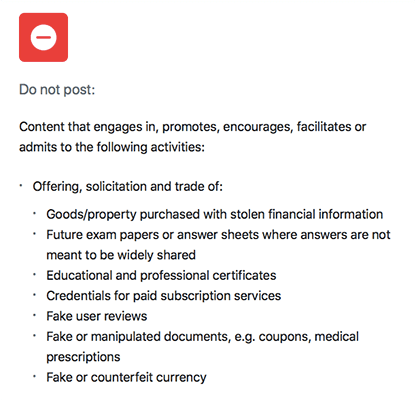
The thing with dishing out freebies in exchange for reviews is that you can never be too sure whether or not the review is genuine or not. This particular violation would need to be proven and when you’re talking about reviews, you’re talking about opinions — and proving an opinion is tough. Virtually impossible, some might say.
But aside from a Facebook guideline violation, publishing fake positive reviews in exchange for freebies (or money) violates your following/audience. Sooner or later, someone is going to buy a product you’ve falsely suggested is amazing, hate it, and then call YOU a liar and a fraud because YOU’RE the one who said it was amazing in the first place.
This particular violation is also specifically mentioned in the Community Standards of Facebook, under ‘Fraud and deception’, because that’s EXACTLY what it is.
16 – You’re participating in follow trains.
Where: Twitter
Violates: “You can’t artificially inflate your own or others’ followers or engagement.” | Platform Manipulation and Spam
And, if you want to get really specific about it, Twitter also says this:
“This includes: … reciprocal inflation – trading or coordinating to exchange follows or Tweet engagements (including but not limited to participation in “follow trains,” “decks,” and “Retweet for Retweet” behavior)”
You might want to think about that the next time you post a tweet that says, “retweet my pinned tweet and I’ll pin yours,” which seems to be the latest trend in Twitter marketing. That’s what Twitter refers to when they say ‘retweet for retweet’.
A ‘follow train’ is designed to boost followers. One person will start the train (Twitter thread) with a tweet that says something like, “Leave your details below & follow each other”. The hope is that everyone who replies to that tweet will eventually follow the rest, giving each of them a few extra followers (lots, in some cases), and opening up the community so that likeminded Twitter users can find and interact with each other.
It makes perfect sense when you think about it, but sadly, it’s a violation of Twitter’s guidelines that could see you lose your account.
And, just before I move on, let’s just briefly stop and discuss ‘decks’. These are like Twitter follow trains, but they’re meant more for engagement. One example of a deck is known as a ‘selfie deck’ — one person posts a selfie, then another person shares their selfie underneath that, and eventually, you’ll have a long thread of people, all posting their selfies in the hope that they’ll get a few extra likes, comments, or followers out of it.
According to Buffer, Twitter threads get 54% more engagement than single tweets, so it does make sense.
It can be great for boosting your self-confidence, but selfie decks, or other types of decks, violate the guidelines. Sorry to rain on your parade and all.
17 – You’re buying or selling accounts/usernames.
Where: Twitter
Violates: “You can’t artificially inflate your own or others’ followers or engagement. This includes … selling, purchasing, trading, or offering the sale, purchase, or trade of Twitter accounts, usernames, or temporary access to Twitter accounts.” | Platform Manipulation and Spam
I know what you’re thinking: why on earth would I buy or sell an account? There are actually many reasons, including:
- You have a large following, no longer want to run the account, and sell it to someone else – followers included – so they can delete your content, rebrand the bio, and use it as their own, or;
- You are offered an account with a large following, ready to rebrand, and you think the higher follower count will be a great way to start off your own venture, or;
- You are ‘squatting’ on a bunch of usernames with the intention to sell them to people who want them for their own businesses or brands later on.
Both of these violate Twitter’s policies and will see your account suspended, or (more likely) terminated, because it’s classed as manipulation.
Buying/selling usernames or accounts also violates the policies of other social platforms, including Facebook, Snapchat, and Instagram.
18 – You repeatedly copy/paste the same comments.
Where: Instagram
Violates: “Help us stay spam-free by not … posting repetitive comments or content.” | Community Guidelines
Not only is copy and pasting the same comments over and over again, on different peoples’ posts terribly annoying, it’s also a great way to get your account flagged for being spam — and social media platforms are really trying to crack down hard on spam.
This kind of practice is also terrible for engagement, and is also a really quick way to get yourself unfollowed. Authentic, genuine comments are the way forward, people.
19 – You call Donald Trump a [insert insult here].
Where: All social platforms.
Violates: Various bullying and harassment policies.
Every single social platform has a section in the terms of service or guidelines that specifically states you are not allowed to harass, wish harm on, or bully another person — and these guidelines are often open to interpretation. What you may see as bullying, for example, another person may not.
Snapchat says this:
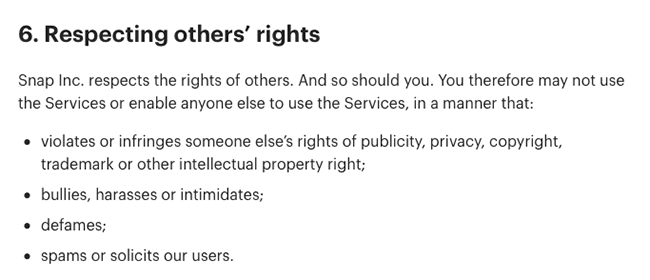
Facebook has a very extensive list of what they considered to be bullying or harassment, which can be found right here.
Twitter is the same, and with the number of people I’ve seen saying something along the lines of: “I hope so-and-so gets the Coronavirus!”, I feel it’s important to bring this particular point to your attention:
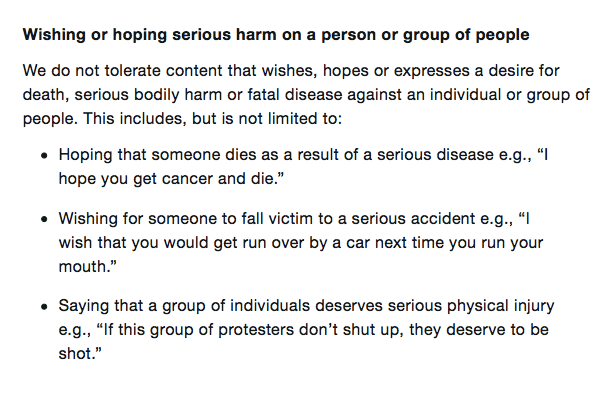
You can find the rest of Twitter’s Abusive Behaviour policy right here.
20 – You repeatedly contact people without their consent.
Where: Facebook
Violates: “Repeatedly contact someone in a manner that is: … unwanted, or … directed at a large number of individuals with no prior solicitation.” | Community Standards ~ Bullying and harassment
If you’re repeatedly sending messages to a bunch of people on Facebook or Instagram (because a lot of these rules and guidelines apply to both) asking them to follow you, buy your products or services, or sign up for something, you’re violating this guideline.
You don’t need to be selling or offering something for this violation to happen, either. Sending a bunch of Facebook messages to an ex-partner who has told you they’re not interested is also repeatedly contacting someone when they don’t want you to.
Just a little bit of food for thought …
21 – You think you have a RIGHT to have a social media account.
Where: All social platforms.
Violates: “Pinterest is provided to you for free. We reserve the right to refuse service to anyone, but we will provide appropriate notice.” | Pinterest Terms of Service
All social media platforms have a little bit on the terms of services somewhere that tells you they can kick you off their site at any time, for any [good] reason, and ESPECIALLY if you violate the terms, guidelines, or policies.

You can’t demand that the customer relations departments reinstate a suspended or terminated account, and you can’t wave around your knowledge of “rights and laws” to get the account reinstated, either.
Just like shops can refuse service at any time, for any [good] reason, so can social media platforms.
And on that note, let’s jump to the conclusion.
Social media guidelines & violations: Conclusion
Your social media accounts are precious. We all take our Facebook/Instagram/Snapchat/Twitter/whatever accounts for granted, assuming we’re doing everything by the book, or that we won’t get caught and punished if we aren’t.
But what happens when you build your account up to thousands or millions of followers and then lose it? What if your social media accounts are your number one source of income, or your number one source of traffic for a blog?
Losing that social media account would be devastating. Even when you don’t have an impressive follower count, losing the account can be gut-wrenching. All of those photos, all of that content … lost.
(I’m still pining over an Instagram account I had five or six years ago, with thousands of followers, from back in the day when getting followers and engagement was a bazillion percent easier than it is now. I still have no idea why the account was suspended and then terminated. I was never informed. SIGH.)
As soon as you click on ‘agree’ on those terms and conditions, upon signing up, you are telling the social platform that you promise to abide by every rule. That’s why they provide you with the T&Cs: you’re meant to read them.
It’s just like a contract: the social platform will uphold their end of the deal (letting you have an account), if you uphold your end (not violating the guidelines or T&Cs). If you do violate a guideline, you’ve broken the contract; therefore, the platform can revoke the contract entirely (take away your account, either permanently or temporarily).
It’s not fun to read through the terms and conditions, policies, or guidelines of any company — but it’s a really good idea to do so when you’re talking about social media. The smallest of violations could see your account gone for good, especially if you are a repeat offender, not even aware that you’re breaking the rules in the first place.
If you want some good advice as far as social media marketing is concerned, why not take a peek at some of the other posts here on Blogging Wizard? You may find these helpful:

